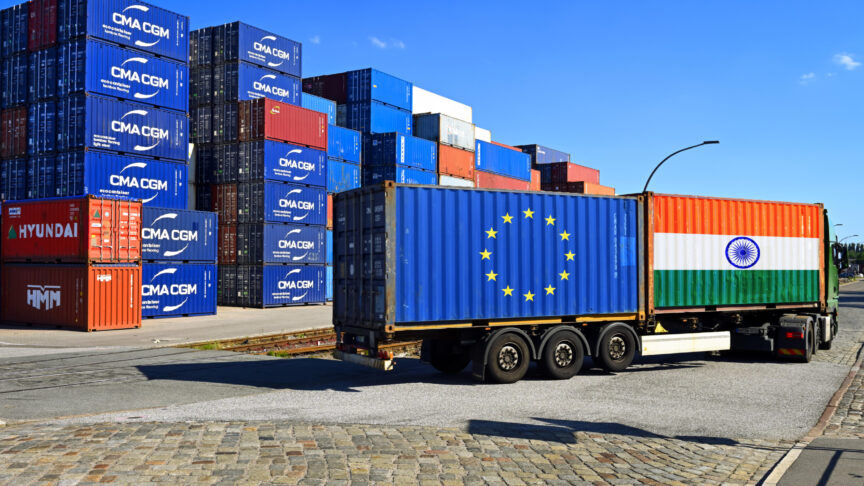How the US could ramp up its economic war on China
There are at least 11 different ways the United States could use economic weapons to harm China in the coming years.
The United States could soon place sanctions on European officials. Last month, a leaked German economics ministry report warned that Congress’s proposed Protecting European Energy Security Clarification Act (PEESCA) could lead to sanctions on ministry staff involved in the inspection and certification of the Nord Stream 2 pipeline.
The report rightly calls this “an entirely new development if it materialised”. For a long time, such a scenario was simply unimaginable – the United States would never move to sanction, directly or indirectly, government officials of allied countries, and certainly not Europeans. So thought many on both sides of the Atlantic. But, as with many of its economic coercion manoeuvres – from export controls to treating European cars as a potential national security threat – the US is breaking one taboo after the other.
There is now a long list of instruments the US could use in a new round of economic warfare with China and others. The selection below focuses on measures that have direct or great indirect relevance for Europe. It is in part based on an extraordinary new report compiled by Republican foreign policymakers in Congress calling for a vast expansion of US economic coercion. Not all of the following measures are necessarily likely to be implemented, but they are all possible over the course of the coming months.
Sanction INSTEX
The US could move to sanction the European financial special purpose vehicle, INSTEX, that France, Germany, and the United Kingdom built to enable trade with Iran in defiance of US sanctions. The US could argue that INSTEX deals with Iranian banks that are subject to US sanctions. This would be an unprecedented escalation in transatlantic relations from Washington. INSTEX has facilitated one transaction to deliver humanitarian goods to Iran in the middle of the coronavirus crisis. It has stated publicly that it will not facilitate transactions that concern goods under US sanctions. Hitting INSTEX, a private financial institution supported by numerous European governments, would be mostly symbolic. It would effectively be about teaching Europeans a lesson.
Snap back JCPOA sanctions on Iran
The Trump administration believes that it can still trigger a mechanism of the Iran nuclear accord (known as the JCPOA), despite it no longer being party to the agreement. Doing so would see the United Nations Security Council impose broad non-US sanctions on Iran, forcing Europeans and others to reimpose their own sanctions on Iran that were in place before the JCPOA.
Cut Russia off from SWIFT and the global financial system
ECFR analysed the possibility of this a year ago. We concluded that the US treating Russia like Iran – by forcing SWIFT, the Belgium-based financial messaging company, to exclude Russian nationals and legal entities – would disrupt Europe’s trade with the country, which is worth €190 billion a year. While this seemed possible, we used this example as a theoretical illustration of the risks for Europeans. Now there is a concrete recommendation to do this in Congress. There is also a recommendation in Congress to declare Russia a state sponsor of terrorism, which would trigger a range of economic coercion tools against the country, with ramifications for Europeans.
Adopt PEESCA on Nord Stream 2
PEESCA is the bill in Congress that would expand the scope of sanctions on Nord Stream 2-related activities and that would probably threaten German federal officials. The bill is attached to the National Defense Authorization Act, like the original PEESA, which imposed the first US sanctions on Nord Stream 2. PEESCA is likely to become law in several months’ time.
Broaden export controls
This is a big area of European concern. The US is using its export control regulations increasingly extraterritorially through re-export regulations that apply when 25 per cent of a product’s content is American (less for some products). It is also using an ever-larger definition of potential military use – the definition of which was significantly broadened, effective as of last week. In May, Washington added 33 new Chinese companies to the entity list (its export control blacklist), because it had found them to have violated human rights or to have ties to the Chinese military. In the future, the US will likely add more Chinese entities to this list. It will continue to leverage broad definitions of such legal terms as “military end use”, as the latest Department of Commerce guidelines demonstrate. These will in many cases create due diligence processes that are meant to exclude any possible military end use so complex that many exporters might think twice about expanding trade of ever more (tech) products to China. This could often mean extraterritorial effects on Europeans, restricting their freedom of trade without giving them much say on the policy.
To pressure Europeans, the Trump administration could also threaten to make exports of their American subsidiaries to China more difficult. There are several examples of European companies’ US subsidiary producing critical parts for machines that in turn are important in the production of technology the US wants to keep away from China. There is a possibility that Washington could use export controls on medical goods too. This has been a well-covered topic in the press in recent months – many governments, not least in Europe, have warned about vaccine nationalism, and Donald Trump may yet attempt this.
Under the SECURE CAMPUS Act or similar measures, the US could exclude Chinese students from certain courses of study.
Weaponise the IMF on 5G
The US could try to force the International Monetary Fund and other global financial institutions like the International Finance Corporation to make emergency and critical development loans conditional upon a complete ban on Huawei in their 5G networks. Given their current stance on Huawei, this could even threaten European countries in a financial crisis. If the US does this with just one company now, it could do the same again with more later.
Impose secondary sanctions on Chinese IP theft
Instead of using tariffs, Washington could use sanctions against companies the US determines to have engaged in intellectual property (IP) theft. This is another, and indeed a perfect, example of a missed transatlantic opportunity that could turn into transatlantic difficulty. The US will be determining all by itself what constitutes significant IP theft, and who to punish and who not. But without transatlantic coordination on this, the extraterritorial effects of US listings of these companies could significantly disrupt European trade with Chinese companies. Countering IP theft is a goal Europeans could align themselves with easily, but the way the US might go about it could instead end up creating difficulties.
Target sanctions on senior CCP officials
Be it officials from the Chinese Communist Party in Wuhan, officials responsible for human rights violations against Uighurs in the Chinese province of Xinjiang, the Hong Kong security law Beijing recently enacted, or those responsible for Chinese policies in the South or East China Seas – or officials directly in President Xi Jinping’s entourage – there are numerous officials the US could easily target directly, typically with travel bans and asset freezes. It has just done so with regard to Hong Kong – sanctioning, with the Hong Kong Autonomy Act Congress passed a few days ago, persons who “materially contribute” to violations of Hong Kong’s autonomous status. These sanctions will have extraterritorial effect. This is less of a concern for transatlantic relations, and is in fact an area of alignment, except potentially in those areas of China policy where the US and Europe might diverge. But Europeans also share concerns about Chinese policies in Xinjiang and Hong Kong.
Force divestment
In May, Trump ordered the main US federal government pension fund, the Thrift Savings Plan, which has a volume of more than $500 billion, to cease investing in China. Larry Kudlow, director of the National Economic Council, and Robert O’Brien, national security adviser, wrote a letter to the pension fund stating that holding Chinese stocks in its portfolio could lead to the “possibility that future sanctions will result from the culpable actions of the Chinese government with respect to the global spread of the Covid-19 pandemic.” For now, this is symbolic. And full-scale divestment is not really an option for the US. But it will still look to force specific divestments from Chinese companies in the US through its Committee on Foreign Investment in the United States, just as it forced tech company Beijing Kunlun to divest from the Grindr app. It could also try to put more pressure on other US funds not to invest in China.
A new instrument of economic coercion?
Congressional Republicans are calling for the creation of a new tool for more calibrated economic coercion – one that is less severe than a Specially Designated Nationals And Blocked Persons listing and that is more comprehensive than an entity list or denied persons listing. Whether this makes much sense or not, the idea is to be able to go after more businesses in more cases without immediately moving to harsh sanctions punishment. Europeans should follow the development of this idea in Washington closely, as a broader arsenal of economic weapons will come with even greater US control over international trade.
Exclude Chinese students from US universities
Congressman Tom Cotton and others have proposed excluding Chinese students from US universities. Under Cotton’s SECURE CAMPUS Act or similar measures, the US could exclude Chinese students from certain courses of study, especially natural and computer science and fields more connected to ‘emerging’ and ‘foundational’ technology such as biotech or artificial intelligence. Cotton’s bill might not go anywhere, but some of its ideas could. The stated goal could be to avoid knowledge transfer to China or ‘espionage’.
Europeans would rarely be the direct target of US measures, but they could be substantially affected. At the same time, Republicans in Congress have proposed a “coalition of likeminded democracies” to replace the UN system. The instinct of bringing the democracies and reliable partners together to confront many issues where Americans and Europeans could align is a good one. But many Europeans do not believe that they are in a war, and they do not think that economic tools are like weapons, or should be used in such a way. And, more importantly, it would be in Washington’s immediate interest to not alienate Europeans through direct and collateral damage to Europe’s economies and foreign policy.
This is the second analysis in a series of three on economic coercion in the coronavirus crisis. The third will list possible Chinese measures against the US or others.
The European Council on Foreign Relations does not take collective positions. ECFR publications only represent the views of their individual authors.


